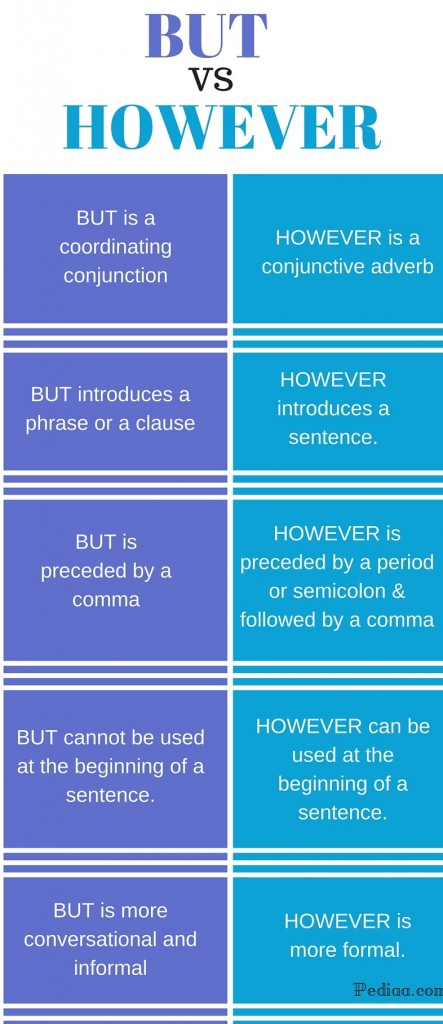Каждый из нас стремится к тому, чтобы как можно четче выражать мысли и доносить до собеседника свой месседж.
Мы соединяем идеи, дополняем, приводим примеры и, конечно, противопоставляем.
Сегодня поговорим о двух словах, которые служат для того, чтобы выражать противопоставление или контраст. Это слова but и however.
Хотя по значению они идентичны, это разные части речи, и их употребление в предложении во многом отличается.
Начнем со всем знакомого слова but, которое переводится, как «но» или «однако». Если есть две идеи, A и Б, причем идея A – главная, а идея Б противопоставляется ей, то, чтобы показать этот контраст, ставим между ними but с запятой. But – это союз, он связывает два предложения: главное и второстепенное, и находится всегда в начале второго:
I love fruit, but I do not like oranges. – Я люблю фрукты, но я не люблю апельсины.
The shirt was quite expensive, but he decided to buy it. – Рубашка была довольно-таки дорогая, но он решил ее купить.
But, как правило, не ставят в начале предложения, хотя многим очень хочется это сделать.
Для английских предложений типично использовать сочетание but not, если во втором предложении по сути повторяется часть первого, только с отрицанием. Поэтому после but not никогда не будет подлежащего и сказуемого, а только та часть, которая контрастирует с главным предложением:
We would like to go on holiday but not in winter. – Мы бы хотели поехать в отпуск, но не зимой.
He showed me some of his works but not all of them. – Он показал мне некоторые из своих работ, но не все.
Выражение противопоставления – основная функция союза but. Есть у него и другие функции, но они заслуживают отдельного урока.
Как же заменить слово but? Не использовать же его всякий раз?
Конечно нет, потому что таким же значением – выражение контраста – обладает и слово however (но, однако). При использовании however нужно помнить о двух вещах: о произношении и пунктуации.
Произношение: /haʊˈɛvə/. Слово часто произносят неправильно. Заметьте, что буквы w и v передают два абсолютно разных звука, о различиях между которыми я рассказывала в этой статье. Потренируйтесь проговаривать слово however вслух, обращая внимание на то, как вы произносите w и v.
С точки зрения пунктуации however обладает своими особенностями, потому что это не союз, а наречие.
Когда идея Б представлена в отдельном предложении, however чаще всего стоит в начале предложения с идеей Б и отделяется запятой. Помимо начальной позиции, можно поставить however в середине или в конце предложения. Но не забывайте отделять его запятыми.
Если идеи А и Б находятся в одном предложении, и противопоставляются при помощи however, тогда перед ним должна стоять точка с запятой, а после – запятая.
Рассмотрим на примерах разные позиции слова however:
I was very busy yesterday. However, I found time to meet with my colleagues. /
I was very busy yesterday; however, I found time to meet with my colleagues. /
I was very busy yesterday. I found time to meet with my colleagues, however. –
Вчера я был очень занят, однако/ но я нашел время встретиться с коллегами.
The weather was hot. However, she was wearing a warm sweater. /
The weather was hot; however, she was wearing a warm sweater. /
The weather was hot. She, however, was wearing a warm sweater. /
The weather was hot. She was wearing a warm sweater, however. –
Была жаркая погода, однако/но она была в теплом свитере.
Вот все, что вам нужно помнить о словах but и however, которые используется для выражения контраста.
Конечно, запомнить и законспектировать теоретические основы – легко. А выражать мысли вслух – это совсем другая задача, с которой справляется далеко не каждый.
Делать это грамотно мы учимся на разговорном курсе, где мы обсуждаем самые различные темы, спорим, дискутируем и активно практикуемся в говорении на английском языке.
100% занятия посвящено вашей речи, а 99% вашей речи на занятии – на английском, никакого русского! Преподаватель корректирует, и помогает работать над ошибками и улучшать речь.
Ну как тут не заговорить? 
Для всех, кто желает прокачать свой устный английский, подойдет Разговорный курс английского по Скайп в онлайн-школе ENGINFORM.
А чтобы вы узнали обо всех преимуществах для себя – мы проводим серию бесплатных пробных занятий, где познакомитесь лично с нашими преподавателями и уже начнете говорить на английском.
Записывайтесь, пробуйте английский по Скайп, приступайте к регулярным занятиям и удивляйте всех своими успехами!
До встречи на занятиях!
Увидели ошибку в тексте? Выделите её и нажмите на появившуюся стрелку или CTRL+Enter.
But and However are two words that are used to show contrast or contradiction in a sentence. The main difference between But and However is that But mainly functions as a conjunction in a sentence while However functions as an adverb.
When to use “But”
But generally functions as a conjunction. It is one of the seven coordination conjunctions in the English Language. But is always used to introduce a clause or a phrase that indicates contrast. Observe this function in the following examples.
I waited for him, but he didn’t come.
The teacher explained the theory to us, but we didn’t understand it.
The two boys got into a fight, but they forgot their fight afterwards.
The food is expensive but delicious.
I know you think it is the right way, but I don’t agree with you.
When But is used as a coordinating conjunction, a comma should be used after the first independent clause. However, if the two independent clauses are brief and balanced, a comma is not necessary.
In addition, it is argued by many grammarians that but cannot be used at the beginning of a sentence, since it is a coordinating conjunction. This rule is strictly followed in academic and formal writing. In such cases, words like However and Nevertheless can be used.
When But is used with a negative form, it indicates the impossibility of anything other than what is being said. For example,
They had no option but to listen to him.
One cannot but sympathize with their plight.
But is also used as a preposition to indicate an exception. In such instance, it gives the meaning of apart from, except, other than.
He was anything but polite to me.
I closed all but one window.
Apart from its function as a coordination and preposition, But also acts as an adverb and a noun.
She started knitting a hat, but didn’t have time to finish it.
When to use ‘However’
However is an adverb that is used to introduce a statement that contradicts something that has been stated previously. The following sentences illustrate this function.
His parents were against this affair. However, he did not think he could live without her.
Jena lost her fortune; however she is still living in a mansion.
Her view, however, was totally contradictory to others’.
We all smiled at each other; however none of us were feeling happy.
However also indicates the meaning in whatever way, in whichever manner. For example, “I can’t agree with you, however I look at it.”
They sold all the cakes. However, they didn’t get a big profit.
Difference Between But and However
Usage
But is mainly used as coordination conjunction.
However is an adverb.
Context
But is used in more conversational, informal context.
However is used in a more formal, academic context.
Beginning of a Sentence
But should not be used at the beginning of sentences, according to traditional grammar rules.
However can be used at the beginning of sentences.
Punctuation Marks
But is often preceded by a comma.(when used as a conjunction)
However is more often preceded by a period or a semicolon and followed by a comma.
Introducing a Sentence Part
But is used to introduce a phrase or a clause.
However is used to introduce a sentence.
But vs However
But and However are two words in English language that have to be understood with precision so that they can be used correctly either in spoken English or written English.
The word ‘however’ is used in the sense of ‘nevertheless’. On the other hand, the word ‘but’ is used as a conjunction between two sentences. This is the main difference between the two words.
It is important to know that the word ‘but’ is used in the sense of ‘although’ as in the sentences,
1. We waited for him for a long time, but he did not turn up.
2. She looked after him very well, but he did not survive.
In both the sentences, the word ‘but’ is used in the sense of ‘although’. You can simply rewrite the two sentences given above as ‘we waited for him for a long time, although he did not turn up’ and ‘she looked after him very well, although he did not survive’.
Take a look at the two sentences given below,
1. We were supposed to go the party last night; however, it was called off much to our surprise.
2. The test match, however, continued despite protests from both the teams.
In both the sentences given above, the word ‘however’ is used in the sense of ‘nevertheless’. The use of ‘however’ has a grammatical peculiarity though. It is used in between two sentences and is followed by a semicolon as you can see in the first sentence. Sometimes it is followed by just a comma as in the case of the second sentence given above.
On the other hand, a sentence should not begin with ‘but’ because it is generally used as a conjunction. Its duty is to connect two sentences. These are the differences between but and however.
Contents
- 1 Is however a conjunction?
- 2 Is however a subordinating conjunction?
- 3 Is however an adjective or adverb?
- 4 What is the adverb of however?
- 5 Is however a connective?
- 6 Is however a preposition?
- 7 Is however a negative word?
- 8 What type of word is however and but?
- 9 Is it however or however?
- 10 Is however a transition word?
- 11 Did However punctuation?
- 12 How do you use the word however in the middle of a sentence?
- 13 What are examples of however?
- 14 Where can I use nevertheless?
- 15 What is the definition of the word howbeit?
- 16 What do you mean by adverbs?
- 17 What are examples of conjunctions?
- 18 What is Howbeit in the Bible?
- 19 Is howbeit formal or informal?
- 20 How do you spell peradventure?
- 21 What is a synonym for Albeit?
- 22 Is albeit in English word?
Is however a conjunction?
However is a conjunctive adverb, not a coordinating conjunction (not a FANBOY). Remember that an adverb modifies a verb, and the word conjunction implies that it’s bringing two separate ideas together. A conjunctive adverb must use a semicolon to connect two independent clauses, NOT just a comma.
Is however a subordinating conjunction?
When used in this way, “however” links an independent clause to a dependent clause, either alone or as part of a phrase (e.g. “however much”). In such cases the word “however”, or the phrase of which it is part, have the function of a subordinating conjunction.
Is however an adjective or adverb?
However can be used in the following ways: as an adverb showing how a sentence is related to what has already been said: Prices have been rising. It is unlikely, however, that this increase will continue. as an adverb (before an adjective or adverb): However hard he tried, he could not control his feelings.
What is the adverb of however?
The most common use of however is as an adverb that connects two sentences/clauses in order to show a contrasting idea. In this use, however is also known as a transition word or a conjunctive adverb. It is common in formal speaking and writing.
Is however a connective?
A connective is a word or phrase that links clauses or sentences. Connectives can be conjunctions (eg but, when, because) or connecting adverbs (eg however, then, therefore).
Is however a preposition?
The word ‘however’ is not a prepositional phrase. First of all, ‘however’ is not a phrase because it has just one word. Phrases, such as noun…
Is however a negative word?
Weird, however, carries a very negative undertone.
What type of word is however and but?
“But” is a conjunction, and “however” is a conjunctive adverb. Confused yet? Don’t be! Simply put, “but” would use a comma to split two sentences, while “however” would use a semicolon or full stop to split the same sentence.
A sentence beginning with ‘however,’ is usually closely related to the sentence which precedes it. In most cases, it is more appropriate to use ‘however’ to form a compound sentence. ‘However’ can be used to interrupt a sentence. Use a comma (,) before and a comma (,) after ‘however’ when you use it in this way.
Is however a transition word?
Transitional expressions include conjunctive adverbs used to join or to connect independent clauses such as however, hence, also, consequently, meanwhile, nevertheless, moreover, and furthermore as well as transitional phrases such as after all, even so, in addition, on the other hand, for example, as a result, and in …
Did However punctuation?
As a conjunctive adverb, however is used to combine two sentences and show their contrast or opposition. … When however is used at the beginning of a sentence, there should be a comma (,) after however if what follows the word is a complete sentence.
How do you use the word however in the middle of a sentence?
You can use it in the middle of a sentence without a comma after it. I couldn’t bring myself to give up my thermal vest, however tired I was of being teased for it. You can also put it at the beginning of your sentence, without a comma afterwards. However you like me to dress, I’ll do the opposite.
What are examples of however?
Sentence examples for which however from inspiring English sources. Which, however you look at it, is pretty sick. Which, however you look at it, seems unlikely. One which, however, was constructed on sand from Florida’s shore.
Where can I use nevertheless?
You use nevertheless when saying something that contrasts with what has just been said. He had problems but nevertheless managed to finish his most famous painting.
What is the definition of the word howbeit?
: although. howbeit. adverb. Definition of howbeit (Entry 2 of 2) : nevertheless.
What do you mean by adverbs?
Adverbs are words that usually modify—that is, they limit or restrict the meaning of—verbs. They may also modify adjectives, other adverbs, phrases, or even entire sentences. … Most adverbs are formed by adding -ly to an adjective. If the adjective already ends in -y, the -y usually changes to -i.
What are examples of conjunctions?
A conjunction is a word that joins words, phrases, clauses, or sentences. e.g., but, and, because, although, yet, since, unless, or, nor, while, where, etc. Examples.
What is Howbeit in the Bible?
Howbeit. be it as it may; nevertheless; notwithstanding; although; albeit; yet; but; however.
Is howbeit formal or informal?
What does but still mean? Is however a formal word? Is whatsoever formal? Is well formal or informal?
…
What is another word for but?
| nevertheless | yet |
|---|---|
| but still | despite that |
•
Apr 30, 2021
How do you spell peradventure?
When Middle English speakers borrowed “par aventure” from Anglo-French (in which language it means, literally, “by chance”), it was as an adverb meaning “perhaps” or “possibly.” Before long, the word was anglicized to “peradventure,” and turned into a noun as well.
What is a synonym for Albeit?
In this page you can discover 11 synonyms, antonyms, idiomatic expressions, and related words for albeit, like: although, even-though, though, even-if, but, while, admitting, altho, whereas, admittedly and surprisingly.
Is albeit in English word?
Albeit is a conjunction that means “even though” or “although.” It can sometimes be used instead of although, even though, or even if. Albeit can never be used to introduce an independent clause, unlike although.
|
however | but | Synonyms | But is a synonym of however.But is a conjunction of however.As adverbs the difference between however and butis that however is nevertheless, nonetheless, even so, that said, in spite of this while but is merely, only. As conjunctions the difference between however and butis that however is in whatever manner (that) while but is except (for), excluding. Preceded by a negation. As a preposition but isoutside of. As a noun but isan instance or example of using the word «but».
|




